Videodrome (IMDB) is a 1983 science fiction/thriller film written and directed by David Cronenberg, and starring James Woods and Deborah Harry.
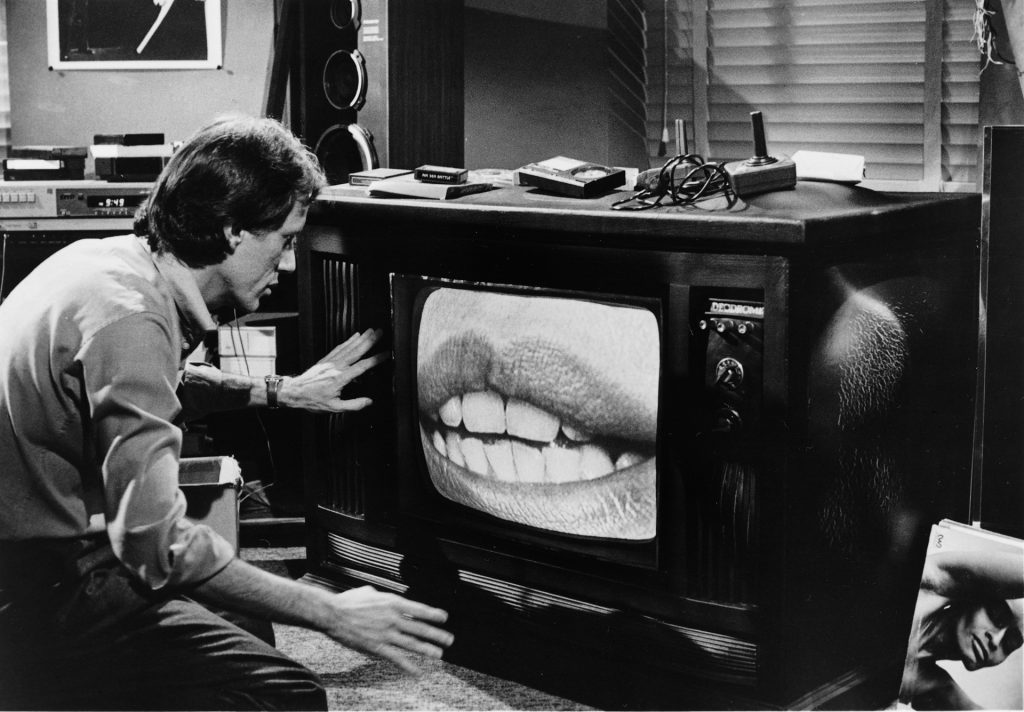
For context, in 1983, less than 10 per cent of US homes had a VCR. (source) By mid-1985, there were 15,000 specialty video rental stores across the USA, and many other retail outlets rented videos. (source) These numbers grew strongly throughout the 1980s. Videodrome was released just at the beginning of this boom, along with the growth of other media channels like cable and satellite TV. Previously, most peoples home visual diet was the major networks and a handful of local stations.
The introduction of new communications media usually come with anxiety, focused on the content of that media. Specifically, fear about sexual and/or violent content. It’s no particular secret that video pornography was a major driver of the home video revolution. Instead of going through the gatekeepers of the government and broadcast networks, now people could acquire sexually explicit videos from a local, unregulated store, or mail order. Satellite TV brought in the possibility of connecting the viewer’s living room to anywhere in the world, including places with much looser rules about sex and violence.
Add to that the persistent urban legend of the snuff film, and you have the beginnings of Videodrome.
The film centers around Max Renn (James Woods), co-owner of Civic TV, a local TV station that specializes in softcore porn. (Based on Toronto’s CityTV, which did air softcore adult movies late at night on weekends in the 1970s.) After a sketchy meeting with some Japanese men in a hotel room, Max brings back a videotape of Samurai Dreams, a softcore Japanese video series, for review by him and his partners.
Max: “What do you think? Can we get away with it? Do we want to get away with it?”
Partner: “Not tacky enough.”
Max: “Tacky enough for what?”
Partner: “Tacky enough to turn me on. Too much class. Bad for sex.”
Max: “I don’t know. It’s soft. Something too soft about it. I’m looking for something that’ll break through, you know. Something tough.”
This sets up two recurring themes of Videodrome: soft vs. tough or hard, and “the Orient” vs. the West.
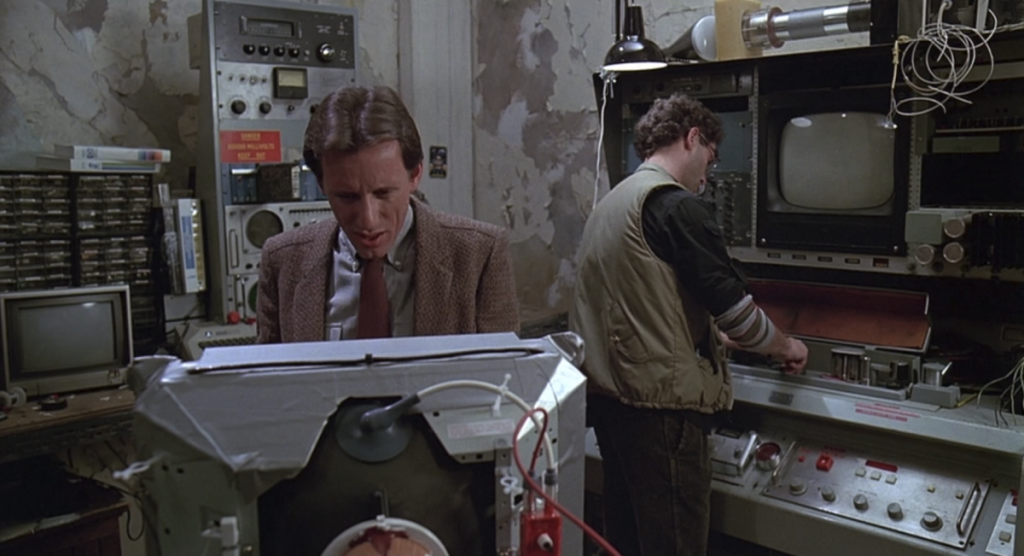
Max finds something “hard” through his off-the-books video pirate, Harlan. Harlan shows him a glimpse of a scrambled signal called “Videodrome”, which appears to be people being tortured by hooded figures in a orange, windowless room. The signal is said to come from Malaysia, maybe. Right away, the “hardness” of Videodrome is associated with the imagined sexual depravity of “the Orient.”
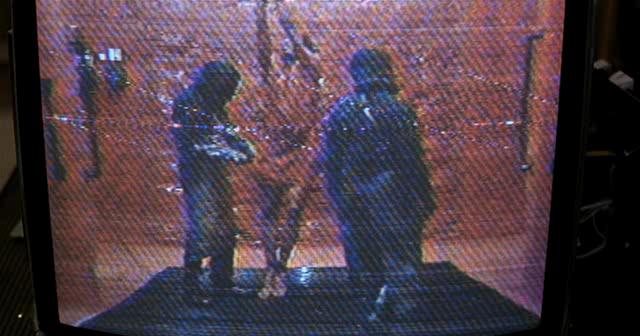
In the next scene, Max appears on a talk show alongside radio therapist Nicki Brand (Deborah Harry). Max makes some pretty glib responses to the criticisms of his station’s programming: “I care enough to give my viewers a harmless outlet for their fantasies and their frustrations. As far as I’m concerned, that’s a socially positive act.”
Nicki responds by saying, “We crave stimulation for its own sake. We gorge ourselves on it. We always want more, whether it’s tactile, emotional, or sexual. And I think that’s bad.”
Back at the pirate station, Max watches another Videodrome clip.
Max: “When does the plot start to unravel here? Who is this black guy here? Is he a political prisoner?”
Harlan: “There’s no plot. It just goes on like that for an hour.”
Max: “Goes on like what?”
Harlan: “Like that. Torture, murder, mutilation.”
Max: “We never leave that room.”
Harlan: “Nope. It’s a real sicko.”
Max: “Brilliant.”
Harlan: “For pervert’s only.”
Max: “Absolutely brilliant. I mean, look. There’s almost no production cost, you can’t take your eyes off it. It’s incredibly realistic. Where do they get actors that can do this?”
Harlan: “Oh, help me, I think he wants it.”
Harlan also says the signal is actually originating from Pittsburgh, not Malaysia. I.e. not from the Far East at all.
Back at Max’s place, Nicki looks through Max’s tapes. “Got any porno?” and finds the Videodrome tape. Max calls it “torture, murder”.
Nicki: “Sounds great.”
She puts the tape in.
Max: “It ain’t exactly sex.”
Nicki: “Says who?”
Max tries to turn it off.
Nicki: “No, no, I can take it. Can you get it any clearer?”
Nicki: “I wonder how you get to be a contestant on this show.”
Max: “I don’t know. Nobody ever seems to come back next week.”
Nicki: “I like it. […] It turns me on. Take out your Swiss army knife and cut me here, just a little.” On her bare shoulder.
Max notices that she already has cuts on her shoulder, and she is wearing a top that bares her shoulder.
Max: “You let somebody cut you?”
Nicki says “a friend” cut her shoulder.
Max: “You let somebody cut you?”
Nicki: “Uh huh. What do you think?”
Max: “I don’t know.”
Nicki: “You want to try a few things?”
While the Videodrome tape plays, Max and Nicki get naked on the rug between the couch and the TV. He pierces her ears with a needle, licks off the blood. They make out with the needle still in her earlobe.
Cut to fantasy/hallucination of Max and Nicki having sex on the black floor of the Videodrome room.
At City TV the next day, Max squeezes the ass of a female employee with nobody batting an eye, then meets with a video agent, Masha. She shows him a softcore, Greco-Roman fantasy called “Apollo and Dionsysius”, suggesting the hard/soft dichotomy is endemic to the West. After Videodrome, Max is unmoved by this, and speaks in terms of realism.
Max: “Darling, I am looking for something a lot more contemporary. I want something that shows people what’s really going on under the sheets. This stuff is too naive, too sweet, like you darling.”
Masha: “Well, it’s your market.”
At another date at Max’s place, Nicki talks about going on assignment to Pittsburgh.
Nicki: “I’m going to audition [for Videodrome]. I was made for that show.”
Max: “Nobody on Earth was made for that show.”
[Max tries to talk her out of it. ]
Nicki: “Sounds like a challenge.”
Max: “You know, in Brazil, Central America, those kinds of places, making underground video is considered a subversive act. They execute people for it. In Pittsburgh, who knows?”
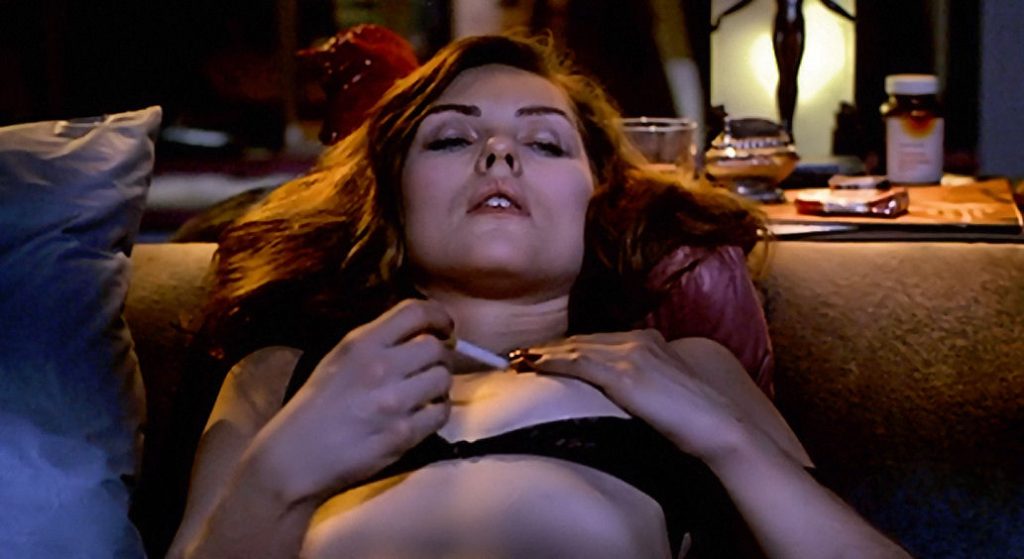
Nicki makes Max watch while she applies a cigarette to her breast.
Max meets with Masha in a Greek restaurant with a female bellydancer, another example of Oriental sensual display. Masha says she knows about Videodrome, and warns him away from it, saying that it is for real, “snuff TV.” Max is indifferent, saying this is just business, and disbelieves her claim that it is real. In exchange for taking on her “Apollo and Dionysius”, Max gets a lead that brings him to a conspiracy behind Videodrome, all the while hallucinating more and more.
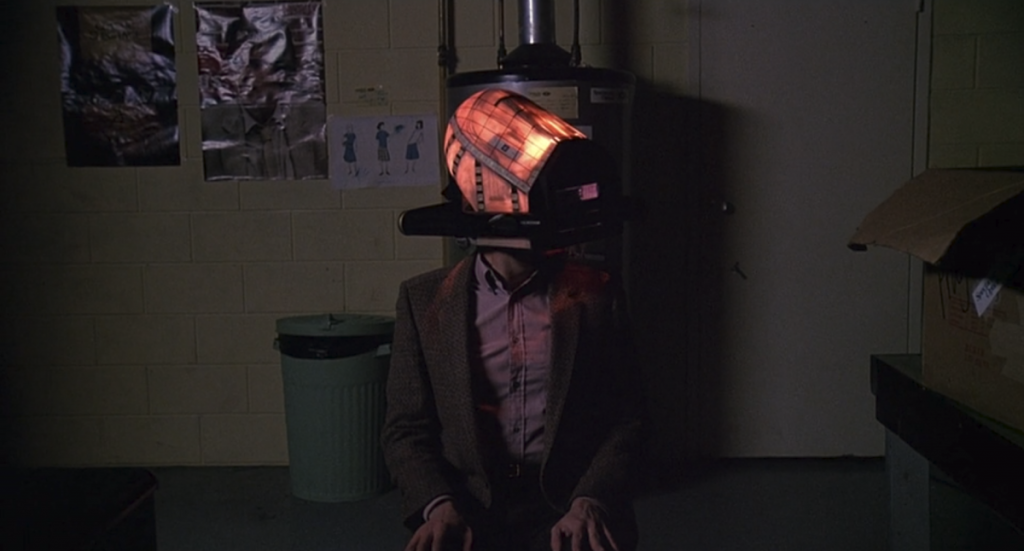
Max gets a call from Barry Convex, an executive at a multinational corporation, Spectacular Optical. Barry wants to record Max’s hallucinations with a large clunky helmet. Barry: “I think that you’ll find a little S&M will be necessary to trigger off a good healthy series of hallucinations. That’s why our Videodrome show is so strange. Something to do with the effects of exposure to violence on the nervous system.”
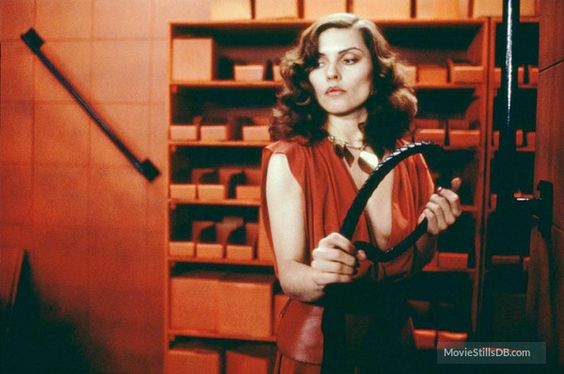
Wearing the helmet, Max hallucinates Nicki (in the red dress) giving him a bullwhip, which he then uses with pleasure on a television set in the Videodrome room, showing first Nicki, then Masha’s face.
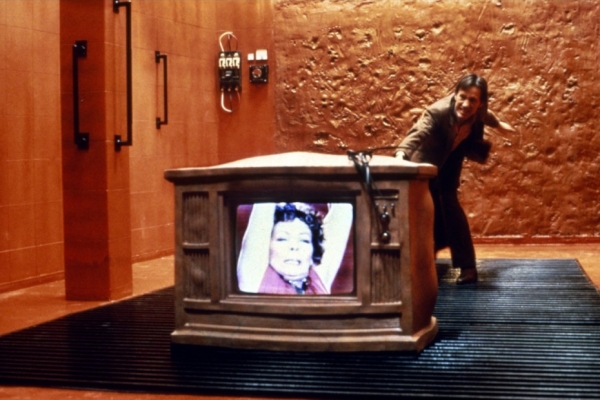
Max eventually goes back to Harlan’s lab, where he finds both Harlan and Barry, who explain things to him. There never was a Videodrome transmission, just tape Harlan played for Max. This is all about Videodrome getting control of City TV and using it to target the particular audience.
Harlan: “It [the signal] really does work on just about anybody.”
Barry: “Anybody who watches it, Max. But why would anybody watch it? Why would anybody watch a scum show like Videodrome? Why did you watch it, Max?”
Max: “Business reasons.”
Barry: “Sure. Sure. What about the other reasons? Why deny you get your kicks out of watching torture and murder?
In other words, the content of Videodrome, the sadomasochism in the orange room, is actually only important in that it attracts certain people to watch it. The signal, if you will, which creates the hallucinations/tumors, is completely separate. The Videodrome conspiracy could have used Bob Ross’ painting lessons or anything else to deliver their signal, but the S&M content is how they target a specific audience, which they perceive as being a problem.
Harlan: “North America’s getting soft, padrone. And the rest of the world is getting tough, very, very tough. We’re entering savage new times and we’re going to have to be pure, and direct, and strong, if we’re going to survive them. And now you, and this cesspool you call a television station, and your people who wallow around in it and your viewers who watch you do it, they’re rotting us away from the inside. We intend to stop that rot.”
Note that Harlan also uses the hard/soft binary, and maps it onto North America=soft and the rest of the world=tough. This inverts the traditional view of the West=tough and the Orient=soft. North America must become strong/hard, and that requires the elimination of weak parts of society, which Harlan describes using the metaphors of softness and liquidity (“cesspool”, “rot”).
Max is “programmed” to assassinate his business partners and a few other targets of Spectacular Optical, before he is captured by the image of Nicki and “reprogrammed” to assassinate Harlan and Barry. Having fulfilled his mission, Max wanders aimlessly until he has what might be called a vision of Nicki, urging him to join him as part of the New Flesh.
Cronenberg has touched on BDSM themes in other films (see Dead Ringers, M. Butterfly and A Dangerous Method), but Videodrome is his most direct discussion of it. There’s the relationship of Max’s desires and actions to the targeted media he perceives, and the idea of a difference between the apparent content of a medium and its impact.
While Nicki has previous experience with BDSM, we don’t know if Max has any. Was piercing Nicki’s ear a first for him, and would he have done it without the influence of the Videodrome signal? Throughout the film, Max denies any personal interest in Videodrome, even though he’s fascinated. He even denies the apparent reality, asserting it must be faked. (That we never really see the Videodrome room, or know where it is, makes it unreal.) His denial of his own desire makes him blind to a source of manipulation.
Nicki’s initiation of kink makes her a kind of Eurydice figure (with Max as Orpheus), tempting Max with pleasure. Obviously, this isn’t exactly SSC, especially in light of HIV, but it does suggest that kink is how Max and Nicki connect.
The condemnation of kink comes from the nominal villains of the piece, Harlan and Barry, who are shown to be paranoid and self-righteous. Controlling pornographic production and distribution is a way of controlling the people who consume it. BDSM itself is not inherently bad, but it can be used in different ways.
Back in 1960, Playboy magazine published “I Remember Babylon“, a short story by Arthur C Clarke, a science fiction writer and engineer who is generally credited with inventing the idea of the communications satellite. The narrator of the story recounts meeting what might best be described as a “mad television producer”. The producer reveals Communist China’s plan to launch a communications satellite and broadcast a mix of violence, hardcore sex, and communist propaganda right into the living rooms of the West, to weaken the viewers.
That’s not how it happened. The Internet is a far more amorphous and intimate medium than communications satellites. Furthermore, the United States is by far the world’s largest producer and exporter of sexually explicit material, followed by the rest of the developed North. The rest of the world is far more repressive in these terms, being under Marxist or fundamentalist Islam regimes. It is “the Orient” that is repressed and craving the decadent pleasures of “the Occident”, and the biggest cultural meme virus of “the Occident” is pornography and other “decadent” media like hip hop and heavy metal.


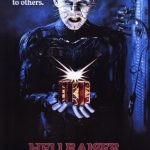

Your reviews are always so insightful. Thank you for sharing.
[…] thriller” sub-genre of film, and you can see the resemblance in the previously discussed Videodrome, Tightrope and 8MM, even though they are mainly about heterosexual sex. The two main elements are […]
[…] like Nicki Brand in Cronenberg’s Videodrome (previously discussed), Claire is an assertive masochist. Her bondage scene with Beverly is a moment of vulnerability and […]